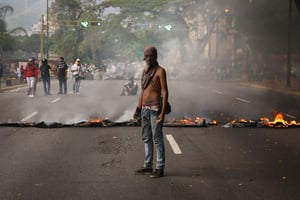Let’s track this journey; before university built a music news and reviews website listed by MTV as one of the then nascent web’s top sources, ventured to the University of Cambridge then to the University of Manchester where he achieved a Master’s Degree in Physics, became a freelance journalist working with numerous global publications based in Caracas, after five years became a Senior Correspondent at Reuters and in 2014 became the creator of ‘Venezuela Econ’ and finally to this day in 2018, the Founder and CEO of Data Drum.
(By Tessa Fyson - Marketing Executive)
Did I miss anything?
I am aware of what you are thinking, what an insanely dynamic back story, a young analytics protegee, graduated with a master’s degree in physics and travelled half way around the world to report on the struggles of others. Even then, to top it all took the information he was witnessing and exposed it to the world.
I wonder, is it witnessing the suffering of other humans or seeing an opportunity to take those down who caused it, that inspired Girish Gupta to create Data Drum … maybe a bit of both?

The best place to start when describing this story is Venezuela. Having witnessed what was happening there for eight years, you can imagine how hard it is to see engineers, doctors and lawyers earning absolute pittance compared to what they have worked so hard for. Even more heart breaking to see families, women and children struggling to find even an egg to eat in two days of trying to obtain food.
I suppose the question then is, what can you do when seeing all this right in front of you? Put so plainly in Girish’s words, this was not a case of searching out the one small store that had a photographic moment to dramatise a bad situation.
It was every day and night on the streets at every location for everyone to see.
Girish wanted after university to be a foreign correspondent, covering war and conflict that can be seen very one-dimensionally. At the time, he did not understand the importance and intricacy of economics, but over time he realised that economics underpins all things of war and conflict.
As the protests got worse and the damaged situation that is Venezuela escalated, foreigners were not experiencing the same lifestyle, including Girish. To obtain money at the time, he had to go through a sort of ‘black market’. It was the only way to get the currency but do not be fooled, this was not a back-street alley dirty deal situation, it is was what was expected. The (to put it bluntly) dog s**t excuse for an economy meant that the exchange rate gave those buying currency a heavenly result. Girish has openly admitted that he has fond memories of living in Marriot hotels and flying to NYC every other weekend.
- Was that considered ‘taking advantage’ of a dire situation – yes.
- Would you off done the same thing – come on, of course you would.
- Would I have done the same – hell yes!
But would any of you stayed to use the information you found and expose it to the public and create a company from it? – Girish did!
You will probably be surprised to know that their government’s solution was to introduce more exchange rates and more ridiculous methods to help patch up the gap in the market fluctuation rate. For those who are not used to the lingo, instead of fixing the problem they tried to make a quick fix by creating more problems.
Skipping through a few details in Girish’s experiences it then led to the question he asked himself, ‘Why is it nobody knows what is really going on?’
These numbers on the ‘black market’, exchange rates and corruption that is explainable on a spreadsheet was being hidden from the public, those who need and deserve to see it. So, in simple terms Girish created a code which led to a website and then now to an app. Doing exactly what I have said above – it showed the world what was really going on. His website and this new app sheds light on the money crisis. Data Drum is a new platform offering clean and automated macroeconomic and social data to explain to people on the streets all the way through to fund managers what is happening.
So, to say you have had quite an intricate career journey so far is probably an understatement. Has this followed to the plan you saw for yourself when you finished University?
"Absolutely not. I didn’t have a clear plan other than to do well in journalism, but I would never have expected to be writing code, caring about economics and certainly not running a company. However, looking back, I can see the trajectory that got me here does make sense (but then it would in hindsight!)."
If you could change / alter one aspect of your career so far what would it be? If nothing, then why? Surely there are some things you would prefer to have gone easier?
"It depends when you ask! Some days I would like to change everything. I would have stayed in physics, done a PhD and worked in academia—or gone into industry. But then I wouldn’t have seen and learned about the world and combined different fields the way I am able to do now. There’s always an opportunity cost to whatever you do and yes, especially on the down days, I wonder what if I’d chosen other paths. I don’t think I’d ever, though, say I would have preferred things to go easier; that may have made me less productive."
A more generic question but why I am very keen to know the reason behind, out of the places you have travelled to as part of your career what one has stuck with you the most and why?
"Venezuela tops the list as it’s the one I spent most time in and therefore got to know best, and through which I got to know myself best. Towards the end of my time there, I hated it. I felt like Yossarian in Catch 22, tormented by how mad the place was and that no one else seemed to get it. But of course, that was more about me than the place. Others did get it; they just knew how to deal with it. When I left, I didn’t want to think about it again. Now, I’m looking back fondly. I learnt so much from it.

On the other end of the spectrum, I find the vibrancy of U.S. cities like New York and San Francisco incredibly enticing. (Perhaps that’s a consequence of some of the less attractive places I’ve visited.) Yes, they have their issues but, in New York especially, I love the vitality, how everyone where is wanting and striving for something, whatever it may be. And there, you really can be who and what you want to be. Though you need money."
You have said previously that you were able to live in hotels and fly very cheaply when living in Venezuela, how did that feel when seeing those in the streets struggling? Did it mean more to you as a privilege?
"One of the things I loved about journalism was being able to engage with everyone from presidents, executives and those that run the world to people living in slums, criminals in the jungle and those who have no say whatsoever. To be able to connect the dots between them, quote them both in the same story as having an impact on each other, really showed me how the world worked. And how so much of success is down to luck.
The dichotomy between my life and that of regular Venezuelans really highlighted the absurdity of the world. Living in London or New York or any major city, we don’t see the connection between our lives and those of Mongolian miners, Chinese factory workers and Guyanese gold miners. My privilege was being able to see—and live—both so close up. That of course was the irony of Venezuela’s socialism: it drove such a wedge between rich and poor that they were both visible in the same place and they were either taking advantage or losing out due to precisely the same government policies."
For those who do not know, describe the moment / pin point / turning point that helped you to create the code to expose what was going on in Venezuela’s economy…
"I wanted to understand the data myself and didn’t see anywhere where I could do that. I knew I could write half a dozen lines of code to get it and some more to put it on a graph. So, I did that. Ultimately, it was curiosity — and that’s what drives good reporting. The turning point to turning it into a business was when I realised that people around the world were using it."
How would you describe the journey of Data Drum from when you started till now?
"I didn’t quite realise what I was taking on! I started by satisfying a curiosity and solving a problem. I then hastily turned it into a business without understanding the concepts of product-market fit and knowing your competition. I’ve learned a huge amount about business and how little of it is about the product."
What are the plans for Data Drum? Expansion? Consistency? Change of direction?
"I’m currently seeking funding which I’ll use to expand the product to cover more countries. I’d like to stay consistent in my principles that public data should be accessible to the public and no one should have to waste time doing what can be done by good."
Do you miss journalism? It was such a huge part of your life, is it difficult to not be involved anymore?
"Absolutely. I think about reporting every day. So many friends and former colleagues are still doing it and I think about what they’re going through, the good and bad. I don’t so much miss the industry as reporting itself.I also consider what I’m doing now as journalism, though not in the traditional sense. Data Drum is about getting information and making it accessible; that’s precisely what I did as a reporter, be it in deep investigations or simply by taking a photograph."
In your opinion alone, what do you see for the future of Venezuela, from your research, data and time living there? Can anything be done to put all this right?
"Things can be put right. The country has the world’s largest oil reserves as well as countless other resources such as stunning beaches, rainforest, Andean mountains, agriculture... So, with good governance, it can be turned around. But how to get that good governance in place? The country’s opposition backed by much of the western world is now closer than ever to pushing the government out of power. That doesn’t mean they’ll succeed though. And, even if they do, will it be enough long term? Venezuela’s deeper problems aren’t just the result of Hugo Chávez and Nicolás Maduro’s inept governance. Chávez came to power for a reason."
If you could put your experience of creating Data Drum into a sentence / quote or statement what would it be? What has all this meant or how has it affected you?
"Not only in creating Data Drum but in everything I’ve done the last few years, i.e., reporting too: Everything is far more complex than it appears at first glance. That’s not a boast that I’ve created or done something complex; rather, it’s the opposite. I’m humbled in the realisation that there’s so much more to everything (and everyone) and that it’s really not a good idea to make immediate assumptions or form baseless opinions. It is obvious and clearly correct but we all do it."
For those analysts out there who want to know more about your process and the works behind Data Drum, is this accessible / usable by anyone?
"Absolutely! The idea is that the mobile apps will be free for all and the website, API, Excel add-in and other features will carry a fee. The process is relatively simple: we get the data from a primary source and write the code to scrape it (based on a library of functions we’ve not put together, making it relatively simple). Those numbers then go into our databases and will update live across all our platforms, hopefully presented in a way that will help people understand them."




-1.png?width=160&height=84&name=ECA23%20Socials%20Email%20FBBest%20eCommerce%20Support%20Business%20(less%20than%2025%20employees)-1.png)
What do you think?
Share your thoughts on this post - whether you agree, disagree or have your own insight to share, we want to hear from you!